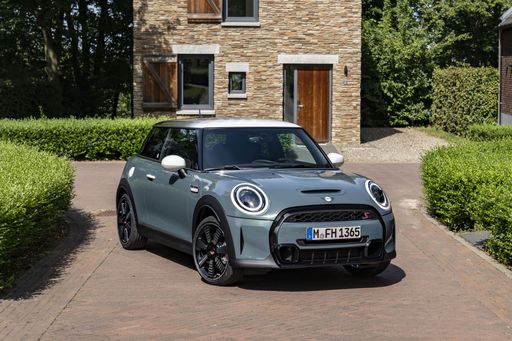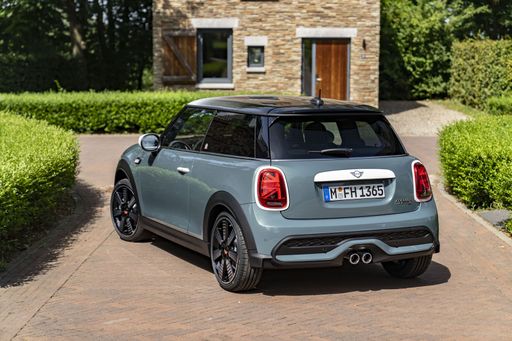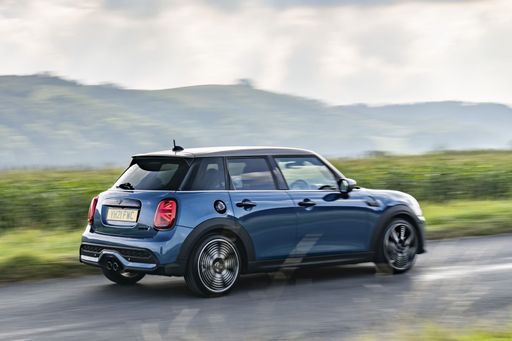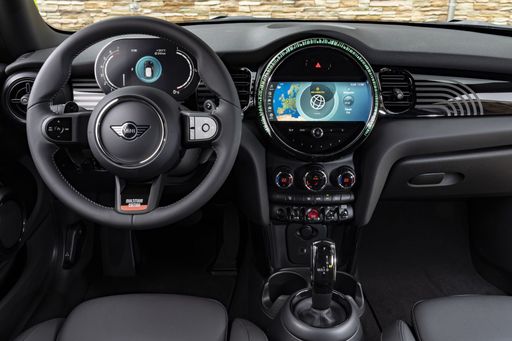Hyundai Kona vs MINI MINI – Differences & prices compared
Compare performance, boot space, consumption and price in one view.
Find out now: which car is the better choice for you – Hyundai Kona or MINI MINI?
The Hyundai Kona (SUV) comes with a Petrol, Full Hybrid or Electric engine and Manuel or Automatic transmission. In comparison, the MINI MINI (Hatchback or Convertible) features a Petrol or Electric engine with Automatic transmission.
When it comes to boot capacity, the Hyundai Kona offers 466 L, while the MINI MINI provides 275 L – depending on how much space you need. If you’re looking for more power, decide whether the 218 HP of the Hyundai Kona or the 258 HP of the MINI MINI suits your needs better.
In terms of consumption, the values are 14.60 kWh4.50 L per 100 km for the Hyundai Kona, and 13.80 kWh5.90 L for the MINI MINI.
Price-wise, the Hyundai Kona starts at 23100 £, while the MINI MINI is available from 23300 £. Compare all the details and find out which model fits your lifestyle best!
Hyundai Kona
The Hyundai Kona blends a bold design with a versatile interior, making it a standout choice in the compact SUV market. Its crisp handling and responsive steering provide an engaging driving experience, whether in the city or on the open road. The vehicle also offers a range of features designed to enhance comfort and connectivity, ensuring a pleasurable journey for both driver and passengers.
details @ hyundai.news
@ hyundai.news
 @ hyundai.news
@ hyundai.news
 @ hyundai.news
@ hyundai.news
 @ hyundai.news
@ hyundai.news
MINI MINI
The MINI MINI offers an iconic design that seamlessly blends classic charm with modern flair, making it a standout choice in urban environments. Its compact dimensions are deceiving, as the interior is cleverly designed to provide ample comfort and functionality, making daily commutes and weekend getaways equally enjoyable. With responsive handling and a spirited engine, driving the MINI MINI delivers an engaging experience that's perfect for navigating both city streets and winding country roads.
details @ press.bmwgroup.com
@ press.bmwgroup.com
 @ press.bmwgroup.com
@ press.bmwgroup.com
 @ press.bmwgroup.com
@ press.bmwgroup.com
 @ press.bmwgroup.com
@ press.bmwgroup.com

|

|
|
|
|
Costs and Consumption |
|
|---|---|
|
Price
23100 - 41600 £
|
Price
23300 - 37500 £
|
|
Consumption L/100km
4.5 - 6.9 L
|
Consumption L/100km
5.9 - 6.8 L
|
|
Consumption kWh/100km
14.6 - 16.8 kWh
|
Consumption kWh/100km
13.8 - 15.3 kWh
|
|
Electric Range
377 - 514 km
|
Electric Range
298 - 402 km
|
|
Battery Capacity
1.3 - 65.4 kWh
|
Battery Capacity
36.8 - 49.8 kWh
|
|
co2
0 - 157 g/km
|
co2
0 - 155 g/km
|
|
Fuel tank capacity
38 - 47 L
|
Fuel tank capacity
44 L
|
Dimensions and Body |
|
|---|---|
|
Body Type
SUV
|
Body Type
Hatchback, Convertible
|
|
Seats
5
|
Seats
4 - 5
|
|
Doors
5
|
Doors
2 - 5
|
|
Curb weight
1370 - 1773 kg
|
Curb weight
1335 - 1730 kg
|
|
Trunk capacity
466 L
|
Trunk capacity
210 - 275 L
|
|
Length
4350 - 4385 mm
|
Length
3858 - 4036 mm
|
|
Width
1825 mm
|
Width
1744 - 1756 mm
|
|
Height
1580 - 1585 mm
|
Height
1431 - 1464 mm
|
|
Payload
420 - 490 kg
|
Payload
345 - 445 kg
|
Engine and Performance |
|
|---|---|
|
Engine Type
Petrol, Full Hybrid, Electric
|
Engine Type
Petrol, Electric
|
|
Transmission
Manuel, Automatic
|
Transmission
Automatic
|
|
Transmission Detail
Manual Gearbox, Dual-Clutch Automatic
|
Transmission Detail
Dual-Clutch Automatic
|
|
Drive Type
Front-Wheel Drive, All-Wheel Drive
|
Drive Type
Front-Wheel Drive
|
|
Power HP
100 - 218 HP
|
Power HP
156 - 258 HP
|
|
Acceleration 0-100km/h
7.8 - 13.3 s
|
Acceleration 0-100km/h
5.9 - 8.2 s
|
|
Max Speed
162 - 208 km/h
|
Max Speed
160 - 250 km/h
|
|
Torque
200 - 265 Nm
|
Torque
230 - 380 Nm
|
|
Number of Cylinders
3 - 4
|
Number of Cylinders
3 - 4
|
|
Power kW
74 - 160 kW
|
Power kW
115 - 190 kW
|
|
Engine capacity
998 - 1598 cm3
|
Engine capacity
1499 - 1998 cm3
|
General |
|
|---|---|
|
Model Year
2024
|
Model Year
2024 - 2025
|
|
CO2 Efficiency Class
D, C, E, F, A
|
CO2 Efficiency Class
D, E, A
|
|
Brand
Hyundai
|
Brand
MINI
|
Hyundai Kona
The Hyundai Kona: A Comprehensive Overview
The Hyundai Kona has established itself as a standout in the compact SUV segment, blending innovation with performance and style. As the automotive world moves towards more sustainable and efficient options, the Kona offers a variety of powertrains, from traditional petrol engines to full hybrids and all-electric models.
Powertrain Options and Performance
The Hyundai Kona's powertrain choices cater to a wide range of preferences. For petrol enthusiasts, the Kona offers a 1.0L T-GDI engine, delivering 100 PS, and a more robust 1.6L T-GDI variant with up to 170 PS. Those looking for efficiency without sacrificing power can consider the full hybrid model, offering 129 PS and an impressive consumption of 4.5 L/100km.
For a greener option, the all-electric Kona provides a compelling case. With battery capacities of up to 65.4 kWh, the electric Kona offers power outputs of 156 to 218 PS, and efficiencies as low as 14.6 kWh/100km, enabling an electric range of up to 513 km.
Technical Specifications and Innovations
Built on a robust platform, the Kona delivers versatility and reliability. With a choice between manual or dual-clutch automatic gearboxes, along with options for front-wheel or all-wheel drive, the Kona ensures a tailored driving experience. The handling is enhanced by the car's lightweight construction, balancing a 1370 to 1773 kg curb weight with dynamic performance.
The Kona's design doesn't compromise cargo space for style; it offers a generous 466 L boot capacity. With a relatively compact body, measuring 4350 to 4385 mm in length, the Kona easily navigates urban environments while still commanding a strong road presence with its 1825 mm width.
Efficiency and Eco-Friendliness
Hyundai is committed to reducing emissions, as evidenced by the Kona's CO2 efficiency ratings, which range from class A for electric models to class D for some higher-performance petrol variants. The focus on reducing environmental impact without sacrificing driving pleasure is notable throughout the Kona range.
Costing and Value
The Hyundai Kona offers commendable value for money. Pricing starts at €26,400 and reaches up to €50,690, depending on the chosen configuration. The monthly running costs range from €956 to €1090, with a cost per kilometre of 38.3 to 43.6 cents, making it a competitive option in its class.
Conclusion: Modern, Efficient, and Versatile
The Hyundai Kona stands as a testament to Hyundai's commitment to innovation, efficiency, and practicality. Whether you are inclined towards a traditional combustion engine, a hybrid for a balance of power and efficiency, or a full electric model for maximum eco-friendliness, the Kona provides a tailored solution for each unique driver preference.
MINI MINI
Introducing the New MINI MINI: A Fusion of Tradition and Innovation
The iconic MINI has always stood out on the roads, known for its unique style and compact size. The latest model series, the MINI MINI, continues to uphold the brand’s reputation while embedding a host of modern innovations that cater to the diverse needs of today’s drivers.
Power and Performance: Under the Bonnet
The MINI MINI offers a range of engine options that cater to different driving preferences. There's the choice of a traditional petrol engine or a more future-oriented electric motor. Petrol variants offer between 156 and 204 PS, providing a satisfying blend of power and efficiency with fuel consumption ranging from 5.9 to 6.4 L/100km. On the other hand, the electric variants come with power ratings of up to 218 PS and offer a driving range between 298 and 402 km on a single charge, with energy consumption measured at 13.8 to 14.4 kWh/100km.
Transmission and Drivetrain: Seamless and Efficient
All MINI MINI models are equipped with automatic transmission systems to ensure smooth and hassle-free drives. The petrol engines feature an automatic dual-clutch transmission (DKG), while the electric variants are paired with a reduction gearbox. Both systems work in harmony with the front-wheel-drive layout, ensuring responsive handling and a dynamic driving experience.
Design and Dimensions: Compact Yet Spacious
The MINI MINI retains its compact dimensions with a length between 3858 and 4036 mm, making it ideal for city environments. Despite its compact size, it offers enough room to comfortably accommodate up to five passengers, with a boot capacity ranging from 210 to 275 litres. The interior is designed to maximise space without compromising on style or comfort, featuring high-quality materials and innovative layouts.
Safety and Efficiency: Future-Ready Technologies
The new MINI MINI is not just about aesthetics and power; it also prioritises safety and environmental efficiency. It complies with the highest safety standards, featuring advanced driver assistance systems. In terms of emissions, the petrol variants have CO2 efficiency classes in the range of D to E, while the electric variants boast an A-class rating, highlighting MINI's commitment to reducing its carbon footprint.
Pricing and Running Costs: Value for Money
With prices ranging from €28,900 to €45,860, the MINI MINI caters to a wide market segment, offering options that suit different budgets. Running costs are competitive, with monthly costs calculated between €868 and €1163 and per kilometre costs ranging from 34.7 to 46.5 cents. This makes the MINI MINI an economical choice, not just in terms of purchase price but also in everyday usage.
The MINI MINI is more than just a car; it's a statement of individuality and a testament to MINI's legacy of innovation and style. With its modern features, efficient performance, and timeless design, it continues to attract those who dare to stand out on the road. Whether you gravitate towards traditional petrol engines or embrace the electrified future, the MINI MINI offers something for every driver.
The prices and data displayed are estimates based on German list prices and may vary by country. This information is not legally binding.
